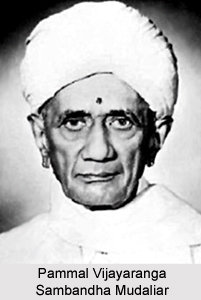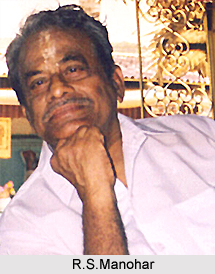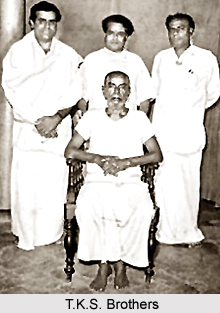 Drama in twentieth century Tamil Literature saw the transformation of traditional poetic drama into modern prose drama. This was accomplished by stalwarts such as T. T. Sankaradas Swamigal, Nawab Govindasamy Rao and Pammal Vijayaranga Sambandha Mudaliar. It may be noted here that the tradition of drama in Tamil literature is quite ancient, in fact as old as the language itself. In fact, drama is so integral to the tradition that Tamil is often spoken of as mutthamizh (threefold Tamil) in which poetry, drama, and music is inseparably interwoven. Not surprisingly, there are references to drama even in Thol Kappiyum (Oldest Commentary), the first and most ancient treatise on grammar in Tamil. Though it was only after the eighteenth century that prose slowly began to make inroads into drama, nevertheless, folk poetic drama such as Kutrala Kuravanchi (Gypsy Dance of Kutralam) and Rama Natakam (The Drama of Rama`s Life) reigned. Even during the nineteenth century, hundreds of verse plays drawing upon the stories in the great national epics Ramayana and Mahabharata made their appearance. Muslim and Christian traditions, too, found an outlet in verse plays such as Ali Padusha and Gnana Soundari Ammal. Great advances were made in Tamil drama in the twentieth century and Tamil drama has proliferated in various genres. The main categories in which Tamil drams are written and staged are discussed below.
Drama in twentieth century Tamil Literature saw the transformation of traditional poetic drama into modern prose drama. This was accomplished by stalwarts such as T. T. Sankaradas Swamigal, Nawab Govindasamy Rao and Pammal Vijayaranga Sambandha Mudaliar. It may be noted here that the tradition of drama in Tamil literature is quite ancient, in fact as old as the language itself. In fact, drama is so integral to the tradition that Tamil is often spoken of as mutthamizh (threefold Tamil) in which poetry, drama, and music is inseparably interwoven. Not surprisingly, there are references to drama even in Thol Kappiyum (Oldest Commentary), the first and most ancient treatise on grammar in Tamil. Though it was only after the eighteenth century that prose slowly began to make inroads into drama, nevertheless, folk poetic drama such as Kutrala Kuravanchi (Gypsy Dance of Kutralam) and Rama Natakam (The Drama of Rama`s Life) reigned. Even during the nineteenth century, hundreds of verse plays drawing upon the stories in the great national epics Ramayana and Mahabharata made their appearance. Muslim and Christian traditions, too, found an outlet in verse plays such as Ali Padusha and Gnana Soundari Ammal. Great advances were made in Tamil drama in the twentieth century and Tamil drama has proliferated in various genres. The main categories in which Tamil drams are written and staged are discussed below.
 Mythological Plays in Twentieth Century Tamil Literature
In the first half of the twentieth century, pioneers such as Kannaiya Naidu and Nawab Raja Manickkam Pillai staged countless plays based on age-old Hindu myths and epics and stimulated bhakti in the hearts of those who witnessed them. In fact, it was quite common for people to pay respect with folded hands to the "gods" whenever they appeared on stage during performances of Dasavatharam (Ten Avataras of Vishnu), Iyappan (Lord Iyappan), Sampoorna Ramayanam (The Complete and Wholesome Ramayana), Bhagavat Gitai (The Bhagavad Gita), and Rama Das (Saint Rama Das). It was also not unusual to see the audience in tears over the trials of Kama or the privations of Panchali (from the Mahabharata) when they were movingly depicted by the veteran actors in their performance of P. S. Ramaiah`s Therotti Makan (The Charioteer`s Son) or Bharathi`s poetic drama Panchaliyin Sabadam. The mythic-epic trend is still very much alive in Tamil drama. For the past two decades, R. S. Manohar has been staging extremely popular and critically acclaimed plays such as Ilankeswaran (Lord of Lanka), Surapadman (Demon Sura), and Viswamithra (Sage Viswamithra).
Mythological Plays in Twentieth Century Tamil Literature
In the first half of the twentieth century, pioneers such as Kannaiya Naidu and Nawab Raja Manickkam Pillai staged countless plays based on age-old Hindu myths and epics and stimulated bhakti in the hearts of those who witnessed them. In fact, it was quite common for people to pay respect with folded hands to the "gods" whenever they appeared on stage during performances of Dasavatharam (Ten Avataras of Vishnu), Iyappan (Lord Iyappan), Sampoorna Ramayanam (The Complete and Wholesome Ramayana), Bhagavat Gitai (The Bhagavad Gita), and Rama Das (Saint Rama Das). It was also not unusual to see the audience in tears over the trials of Kama or the privations of Panchali (from the Mahabharata) when they were movingly depicted by the veteran actors in their performance of P. S. Ramaiah`s Therotti Makan (The Charioteer`s Son) or Bharathi`s poetic drama Panchaliyin Sabadam. The mythic-epic trend is still very much alive in Tamil drama. For the past two decades, R. S. Manohar has been staging extremely popular and critically acclaimed plays such as Ilankeswaran (Lord of Lanka), Surapadman (Demon Sura), and Viswamithra (Sage Viswamithra).
Historical Plays in Twentieth Century Tamil Literature
Though staging historical plays in Tamil is a costly and daunting proposition, due to the background scenery, costumes, events, and dialogues which have to be accurate and authentic, nevertheless, the challenge has been met time and again. In the 1950s and 1960s, the well-known T.K.S. Brothers staged immensely popular historical plays such as Raja Raja Chola (The Great Chola King Raja Raja) and Kappalottiya Tamizhan (The Tamilian Who Plied Ships), a play based on the life and achievements of V. O. Chidambaram Pillai, who fought for freedom from British rule during the 1930s and became famous throughout the country as the first Tamilian to challenge the British merchant navy on the high seas. The T.K.S. Brothers were not totally alone in launching historical plays. The famous cinema actor Sivaji Ganesan brought the heroic life of a pioneer freedom fighter to the stage and into the hearts of the Tamil people in Veera Pandiya Katta Bomman. However, it is R. S. Manohar who must be credited with the establishment of historical plays on rock-hard foundations of historical research and realistic dramatization. By combining split-second timing, dazzling special effects, moving dialogues, and powerful acting, Manohar mesmerized audiences by recreating famous and even controversial historical figures in Chanakya Sabadam and Malik Kafoor, so that Chanakya and Malik Kafoor imprinted themselves indelibly in Tamilian minds. Among his later works, the play Thirunavukku Arasar (Saint Thiruna-vukku Arasar)-a dramatization of the life of the Saivite saint Appar, who came into conflict with, and triumphed over, Mahendra Varma Pallava thrills audiences all over Tamil Nadu and Southeast Asia.
 Plays of Social Realism in Twentieth Century Tamil Literature
Though Tamil prose plays that dealt convincingly with the ups and downs in the life of ordinary people began to be written and produced as early as the last decades of the nineteenth century, not till the mid-twentieth century did social realism come into its own domain. Again, the T.K.S. Brothers and S. V. Sahasranamam did much for the Tamil stage by dramatizing classic novels by literary greats such as Kalki, Akilan, and T. Janakiraman. Thus, literary works such as Kalki`s Kalvanin Kadali (The Thief`s Beloved), Akilan`s Vazhvil Inbam (Happiness and Life), and Janakiraman`s Vadivelu Vaddhiyar (Vadivelu Teacher) and Nalu Veli Nilam (Four Acres of Ground) came to the stage and captured a permanent place for themselves in Tamil drama. At the same time, plays by C. N. Annadurai, who led the anti-Brahminical DMK movement and eventually became the chief minister of Tamil Nadu, also came to the fore. Annadurai`s plays, such as Velaik Kari (Servant Maid), Or Iravu (One Night), and Needhi Devan Mayakkam (The God of Justice`s Bewilderment), forcefully attacked social evils such as bribery and casteism and unmasked the hypocrisies of the powerful. In the 1960s and 1970s, K. Balachandar`s extremely well received plays such as Malliyam Mangalam (Man-galam of Malliyam) captured the attention of theater-goers by focussing on the problems, dilemmas, bonds, and affections that beset ordinary, middle-class households in Tamil Nadu.
Plays of Social Realism in Twentieth Century Tamil Literature
Though Tamil prose plays that dealt convincingly with the ups and downs in the life of ordinary people began to be written and produced as early as the last decades of the nineteenth century, not till the mid-twentieth century did social realism come into its own domain. Again, the T.K.S. Brothers and S. V. Sahasranamam did much for the Tamil stage by dramatizing classic novels by literary greats such as Kalki, Akilan, and T. Janakiraman. Thus, literary works such as Kalki`s Kalvanin Kadali (The Thief`s Beloved), Akilan`s Vazhvil Inbam (Happiness and Life), and Janakiraman`s Vadivelu Vaddhiyar (Vadivelu Teacher) and Nalu Veli Nilam (Four Acres of Ground) came to the stage and captured a permanent place for themselves in Tamil drama. At the same time, plays by C. N. Annadurai, who led the anti-Brahminical DMK movement and eventually became the chief minister of Tamil Nadu, also came to the fore. Annadurai`s plays, such as Velaik Kari (Servant Maid), Or Iravu (One Night), and Needhi Devan Mayakkam (The God of Justice`s Bewilderment), forcefully attacked social evils such as bribery and casteism and unmasked the hypocrisies of the powerful. In the 1960s and 1970s, K. Balachandar`s extremely well received plays such as Malliyam Mangalam (Man-galam of Malliyam) captured the attention of theater-goers by focussing on the problems, dilemmas, bonds, and affections that beset ordinary, middle-class households in Tamil Nadu.
Comedies in Twentieth Century Tamil Literature
Comedies were first introduced onto the Tamil stage by Sambanda Mudaliyar through his full-length humorous play Sabhapathi. Following in his footsteps, Devan created humorous masterpieces such as Thuppariyum Sambu (Detective Sambu) in the 1950s. A decade later, K. Balachandar went on to contribute immensely to the field of comedy Tamil plays by means of his various works such as Server Sundaram (Waiter Sundaram) and Edhir Neechal (Swimming against the Current). Meanwhile, Cho`s polemical plays not only served as great comedic episode but also highlighted the deeds and nature of self-serving politicians. Cho`s play Mohammed Bin Tughlak, for example, received rave reviews and played to packed audiences all over Tamil Nadu. It is probably one of the finest political satires in modern Tamil drama. Recently, however, the trend on the Tamil stage is toward plays that are merely absurd and cause much laughter. Dramatists like Crazy Mohan, S. V. Sekhar, and Mouli are busy churning out such "entertainers."
It is therefore evident from the ongoing discussion that Tamil drama has made and continues to make tremendous advance in several directions.













